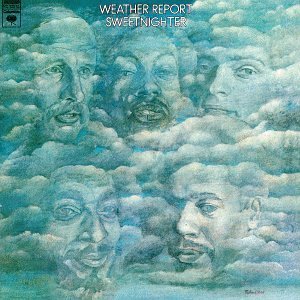
Sweetnighter is the third studio album by American jazz fusion band Weather Report, released by Columbia Records in 1973.

Word of Mouth is the second solo studio album by American bassist Jaco Pastorius, released in 1981, while he was still a member of the jazz fusion group Weather Report, and also the name of a big band that Pastorius assembled and with which he toured from 1981 to 1983.

The Complete Bitches Brew Sessions is a four-disc box set by jazz trumpeter Miles Davis compiling recordings between August 19, 1969, and February 6, 1970—including the 1970 double album Bitches Brew in its entirety—and released on Columbia/Legacy on November 24, 1998.
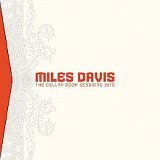
The Cellar Door Sessions 1970 is a boxed live album released in 2005. It compiles six of ten sets that were performed over four December nights in 1970 at the D. C. nightclub the Cellar Door. Despite similar formatting, it is not a part of the Miles Davis Series of box sets.

The Complete Jack Johnson Sessions were recorded in April 1970 by Miles Davis, and released in September 2003. These sessions formed the basis for the 1971 album Jack Johnson, as well as some of the studio portions of Live-Evil.
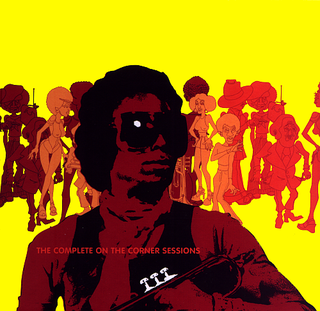
The Complete On the Corner Sessions is a posthumous box set by American jazz musician Miles Davis, released in the US on September 25, 2007, by Columbia Records and in the UK on September 29 on Legacy Recordings. Like other Davis box sets, the included material is taken from a wider chronology of sessions than the dates which actually produced the titular album. The Complete On the Corner Sessions compiles material from 1972 through 1975 which, due to lineup changes Davis made throughout the era, features over two dozen musicians.

Straight Life is a soul/funk influenced jazz album recorded in 1970 by trumpeter Freddie Hubbard. It was recorded on 16 November 1970 and released between the albums Red Clay (1970) and Sing Me a Song of Songmy (1971). This is also Hubbard's eighteenth overall album.

Ruta and Daitya is jazz album by pianist Keith Jarrett and drummer Jack DeJohnette recorded in May 1971 and released on ECM in 1973—one of Jarrett's rare performances on electric keyboard.

Porgy & Bess is a 1997 album by the jazz saxophonist Joe Henderson, released on Verve Records. It contains Henderson's arrangements of music from George Gershwin's opera Porgy and Bess. It was his final album as a leader.
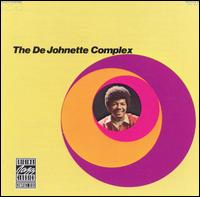
The DeJohnette Complex is the debut album by Jack DeJohnette featuring Bennie Maupin, Stanley Cowell, Miroslav Vitous, Eddie Gómez, and Roy Haynes recorded in 1968 and released on the Milestone label in 1969.

Sorcery is an album by Jack DeJohnette featuring Bennie Maupin, John Abercrombie, Mick Goodrick, Dave Holland and Michael Fellerman recorded in 1974 and released on the Prestige label. The Allmusic review by Scott Yanow states, "A lot of rambling takes place on this interesting but erratic CD reissue... While one admires DeJohnette's willingness to take chances, this music has not dated well".
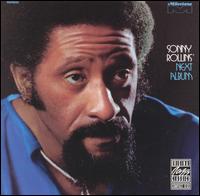
Next Album is an album by jazz saxophonist Sonny Rollins, his first to be released on the Milestone label, featuring performances by Rollins with George Cables, Jack DeJohnette, Bob Cranshaw and Arthur Jenkins. The cover photography was credited to Chuck Stewart.
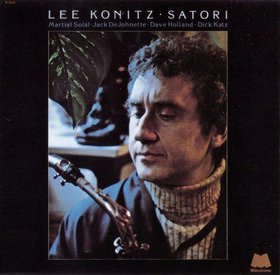
Satori is a jazz album by saxophonist Lee Konitz. It was originally released in 1975 on Milestone label as MSP 9060 and remastered in 1997. The album features some classic jazz standards besides other experimental compositions such as "Satori". Three of the seven tracks are Konitz compositions.

Zawinul is the third studio album by jazz composer and pianist Joe Zawinul recorded in 1970 by Zawinul performing music arranged for two electric pianos, flute, trumpet, soprano saxophone, two contrabasses, and percussion. The album reached number 17 in the Billboard Jazz album charts.

Jacknife is an album by American saxophonist Jackie McLean. It actually comprises two volumes, one recorded in 1965 and the other in 1966. They were originally given the catalogue number of BLP 4223 and BLP 4236, but were shelved for ten years and issued together in 1975 as a double LP, with the number BN-LA457-H2. Whilst the 1965 tracks were released on a limited edition CD in 2002, those from 1966 have never been released singularly; however, they can be found on the four-disc Mosaic compilation The Complete Blue Note 1964–66 Jackie McLean Sessions, which was limited to 5,000 copies.

The Essential Miles Davis is a 2-CD compilation album by Miles Davis released by Columbia Legacy on May 15, 2001. It belongs to Sony Music Entertainment's "The Essential" series, not to the series "Essentials", established by WEA International, and was released as part of Sony's Miles 75 Anniversary program. In 2008, The Essential Miles Davis 3.0 was released as a limited edition album featuring a bonus third disc that added five more songs to the original track list.

Directions is a compilation album by American jazz musician Miles Davis, released in 1981 by Columbia Records. It collects previously unreleased outtakes that Davis recorded between 1960 and 1970. Directions was the last of a series of compilation albums—mostly consisting of, at that time, previously unreleased music—that Columbia released to bridge Davis' recording hiatus that ended with the Man with the Horn in July 1981.

Body Talk is a 1973 studio album by American guitarist George Benson, released on CTI Records.

Black Is the Color is an album by the American saxophonist Joe Henderson, released in 1972 on Milestone. The original idea for the album was "to approach it entirely from the standpoint of having no pre-conceived ideas for the musicians to relate to." However, after listening to a tape copy of one segment of the original session, the saxophonist, "became aware of further possibilities. Making full use of 16-track tape, we could add to and improve upon what had already been recorded by multiple overdubbing of new parts, by myself and others, that would become permanent additions to the track." The players include keyboardist George Cables, bassists Dave Holland and Ron Carter, drummer Jack DeJohnette and percussionist Airto.

The Elements is an album by the American saxophonist Joe Henderson, released in 1974 on Milestone. The musicians included violinist Michael White, bassist Charlie Haden, drummer Leon Chancler, percussionist Kenneth Nash, and featured guest Alice Coltrane on keyboards & harp.




















